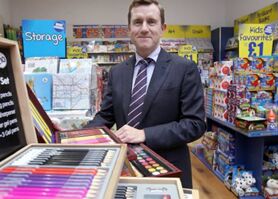创始人该不该卖掉自己的公司
|
Dean Hoyle sold his greetings card business for £400m in 2010. It is now listed on the stock market and worth more than £1bn. Does he have any regrets? “None at all,” the co-founder of UK retail chain Card Factory says. “What can you do with £1bn that you cannot do with £400m?” Mr Hoyle, 50, is lucky to feel so sanguine. Many entrepreneurs find it hard to leave their “baby” behind. Some are forced to remain for a time as part of the sales agreement because buyers want to ensure the company does not collapse without the founder’s guiding force. Others insist on staying, simply because they are not ready to go.
Research by Coutts, the private bank, in 2012 found that only a quarter of UK entrepreneurs retire following the sale of their business. The rest pursued a number of roles: 74 per cent advised another business, 65 per cent invested in one and half undertook philanthropy. More than half go on to start another business of their own. The sale of Card Factory, which Mr Hoyle started with his wife Janet in 1997, to private equity allowed him to concentrate on his other loves: his three children and Huddersfield Town football club, which he owns and chairs. “I took the business from a £10,000 loan into a £60m ebitda business. Over those 12 years I saw very little of my children. They were with their grandparents at the weekend. I needed a work-life balance.” He remained non-executive chairman after the sale to Charterhouse Capital Partners. When it floated the business in 2014 he stepped down to become a non-executive director. He no longer has shares in or any role at the Card Factory, although he confesses to a twinge of pride when he passes a store. “It still has the same simple logo. I remember being sat in my living room designing it.” Sometimes founders and companies realise they made a mistake in parting company. Silicon Valley already has a tradition of founder comebacks. Steve Jobs returned to save Apple from bankruptcy in 1997. Michael Dell left his eponymous computer maker in 2004 but returned three years later and in 2013 bought the company back from the public market. Rather than exit the business, many entrepreneurs decide to take an equity injection and carry on at the helm. This allows them to take some cash, diversifying risk, and receiving money for expansion. But with private equity usually wanting a return within five to seven years there is pressure to find fresh investors or accept a full sale. Reluctance to move on after a sale might be misguided, however. “Founder-CEOs who are able to conduct a personal skills analysis and let go of their leadership roles when needed give their companies the greatest chance at long-term success,” says Suren Dutia, a fellow at the Kauffman Foundation in the US, which researches and advises on entrepreneurship. Mr Hoyle had no such misgivings and has made a comeback as chairman of stationery, books and gift chain The Works. With his children older, he has time for another job and wants to demonstrate the high street has a future. “Opportunities like The Works do not come up every day. It is a business where I can replicate what I have done and it suits my skill set. I think you go through stages in life. I have got cash in the bank, I have done the holiday villa and time with the family. I’m ready to work.” |









